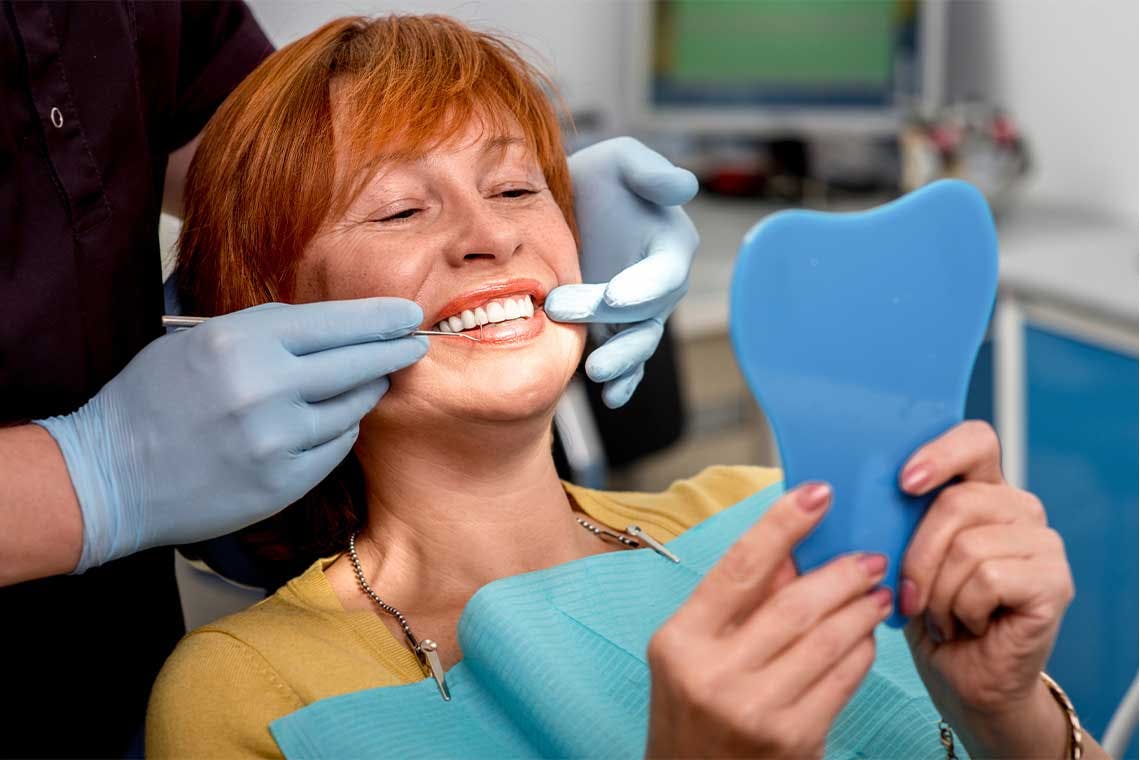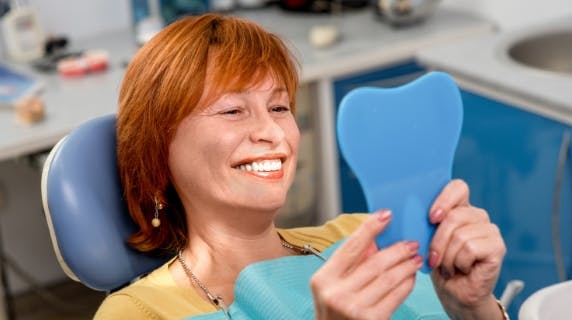
How Long Are Partial Dentures Anticipated to Last?
If you’re new to partial dentures, it’s vital to know how long they are anticipated to last before your dentist recommends that they need to be replaced. This can help you maximize their longevity so they can keep delivering a winning smile for years to come. Learn all about partials and how they differ from full dentures.
Key Differences Between Partial and Full Dentures
Unlike a full set of dentures, partial dentures are helpful for those who are missing just a few of their teeth. Consisting of a series of replacement teeth mounted on top of a metal or plastic base, they are removable and can fit over or around your existing teeth.3
Depending on the types of partial dentures, they either fit on the roof of your mouth, around the top of your existing teeth or next to your teeth via clasps or connectors.3
Like full dentures, partials are custom fitted to your mouth.1 They may not be as expensive, but it may require multiple visits and a consultation with a dental professional to prepare for partial tooth extraction and care, both during and after the procedure.
How Long Are Partials Anticipated to Last?
On average, partial dentures can last anywhere from 5 to 15 years.1 This can last even longer with regular care and maintenance. Consult with your dentist if you have any concerns with your partial denture. Factors that may affect the lifespan of your partial dentures may include:
- Material: while higher-quality materials such as acrylic and full metal may cost more, they will also last longer than less expensive options such as plastic.
- Maintenance: cleaning and sanitizing your dentures routinely can ensure that the dentures stay supple and intact while preventing cracks or staining.2 Dentures require moisture to fit properly and retain their shape,2 so it’s important to soak dentures overnight in water or a mild denture-soaking cleanser like Polident Overnight Denture Whitener Cleanser.
- Wear and tear: dentures can show signs of damage like cracking, chipping, discoloration, or missing teeth. If you’re in an accident, been injured in the mouth, or dropped your dentures, speak to your dentist about replacing your partials.
- Tooth shifting: your natural teeth can shift into the gaps left behind by your removed teeth. In addition, your jawbone can change shape, your gums can shrink, or more of your natural teeth may require extraction. All of these factors may result in your dentures fitting poorly, coming out of alignment or falling out. Visit your dentist routinely to have your mouth and partial dentures checked.
Signs You May Need to Replace Your Dentures
Replacing your dentures might be a necessity, especially to prevent discomfort or to ensure that your smile is straight and aligned. Your full or partial dentures may need to be replaced if the following happens, which is why it is important to visit your dentist regularly:2
- They’re causing irritation, especially by the base of your gums
- Your denture’s teeth are cracked, stained, or missing a replacement tooth
- Your dentures are slipping or coming loose in your mouth, especially if your teeth have shifted
How to Take Care of Partial Dentures
Cleaning your partials every day is not only necessary to maintain their hygiene and durability, but it’s easy too! Just like your teeth, partials need to be cleaned daily to remove plaque, bacteria and leftover food particles. This can prevent them from being stained or turning yellow in appearance.
Brush your partials once or more a day with a soft-bristled toothbrush and use a gentle non-abrasive cleanser like Polident 3-Minute Denture Cleanser. When not wearing your partials, be sure to keep them in a protective carrying case or the storage recommended by your dentist.
Finally, combine your denture cleaning routine with daily oral care such as brushing twice a day, regular flossing and rinsing with mouthwash.
Be sure not to drop your partial dentures—brushing them over a towel or soft surface is the most effective way to prevent cracks and breaking from damage. Don’t expose them to extreme hot or cold temperatures and be sure to use room-temperature liquids when soaking your dentures. Avoid frequently consuming hard or brittle foods or chewing ice, as this can increase wear and tear on your partials.
The Importance of Dental Visits
Missing teeth can shake one’s confidence and teeth will need to be replaced with age. Partial dentures are an important investment not only for your mouth health and hygiene, but your own appearance. That’s why it’s important to know how long partials can last and how to take proper care and maintenance for maximum longevity. If you’re having problems with how your dentures look or wear, visit your dentist for regular check-ups so that they can assess the condition of your partials, make adjustments and provide guidance to avoid discomfort, sores or chafing.3 And be sure to schedule regular dental visits to keep your mouth healthy and your smile as sharp as ever.
Source Citations:
- Dental Bridges. Cleveland Clinic. https://my.clevelandclinic.org/health/treatments/10921-dental-bridges/. Accessed 6/26/2023.
- Denture care: How do I clean dentures? Mayo Clinic. https://www.mayoclinic.org/denture-care/expert-answers/faq-20058375/. Accessed 6/26/2023.
- Dentures Partial. MouthHealthy. https://www.mouthhealthy.org/all-topics-a-z/dentures-partial/. Accessed 6/26/2023.




